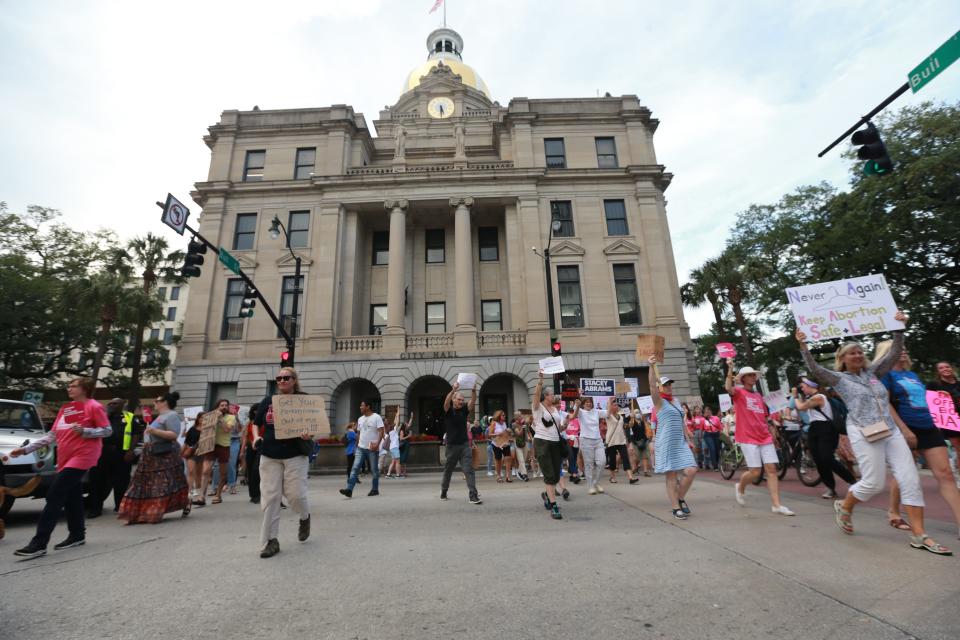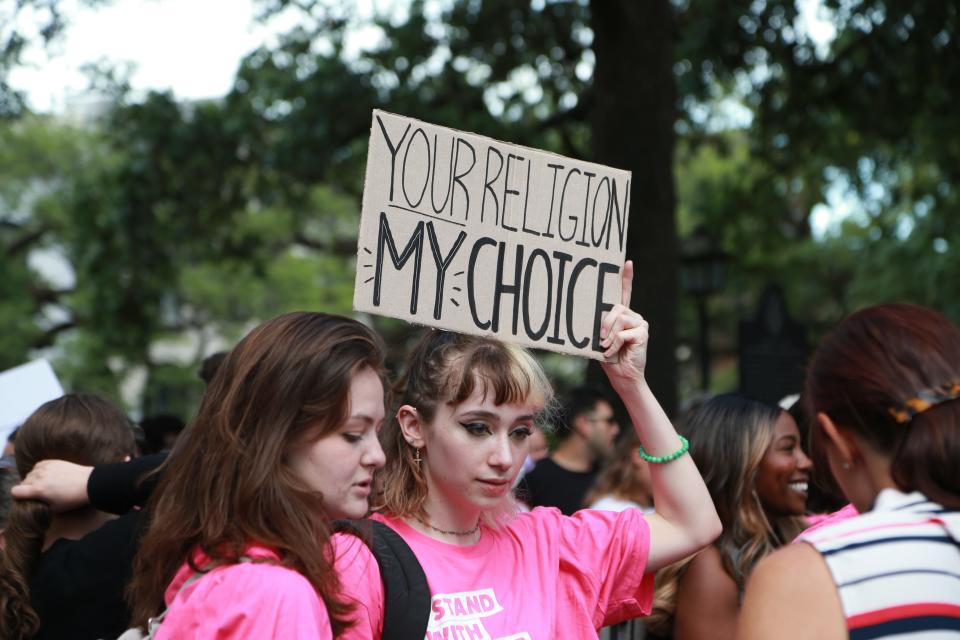Religion and abortion debate: How Savannah faith leaders view likely repeal of Roe v. Wade
The prospect of the United States Supreme Court overturning Roe v. Wade has divided the nation. In what could be a watershed moment for abortion policies, the faith community, especially, has been thrust into the spotlight.
Conservative Christian churches that teach that life begins at conception have fueled the anti-abortion argument. For the nearly five decades that the Roe v. Wade ruling has been in place, the religious right has been working to overturn it.
'Why are we still in this fight?': Savannah reacts to possible overturn of Roe v. Wade
Roe v. Wade : Abortion-rights supporters rally in response to leaked SCOTUS draft reversing Roe vs. Wade
As a leaked Supreme Court draft opinion suggests, the landmark 1973 decision providing federal protection for abortion could be reversed this summer, leaving policies up to state governments – a majority of which in the Southeast would move to severely restrict or ban abortion.
If the Supreme Court does strike down Roe v. Wade, 22 states are poised to ban abortion as quickly as possible, according to the Guttmacher Institute. Georgia’s suspended “heartbeat bill”, which bans abortions as early as six weeks, could move forward. The nearest clinic state for Georgians would be North Carolina.
The move would be the answer that many in conservative faiths have long hoped for. But the likelihood of Roe being struck down has highlighted just how divisive the abortion debate is within religious communities as well.
Anti-abortion stances about 'choosing life'
In Savannah, views on abortion vary widely among the faithful. Representatives for area churches spoke on their personal views with the caveat that their perspectives might not reflect each member of their congregation.
In a prepared statement, the Roman Catholic Diocese of Savannah, which counts nearly 80,000 members across 56 South Georgia churches, plainly called for the reversal of Roe. The Catholic Church has traditionally opposed all forms of abortion.
“As Catholics, we care about every unborn child and every mother,” the statement read. “The Diocese of Savannah will continue to aid and accompany women and couples who are facing unexpected or difficult pregnancies by offering them the resources, support and knowledge they need to choose life.”
Rev. Craig Stephens of Christ Church Anglican echoed the Catholic church on its central tenet that life begins at conception. However, Stephens emphasized that the Supreme Court decision only plays a part of the church’s overall mission of “promoting the sacredness of life.”
Said Stephens, “We know that the answer is not going to be in legislation or laws, the answer is going to be in how we love one another and how we promote flourishing of life both in and outside the womb. ...that might be foster care, it might be an after-school program. We have to be active in promoting life regardless of what the Supreme Court does.”

The Anglican pastor once served as a chaplain at a pregnancy resource center, so the issue of abortion falls “near and dear to his heart.”
Other religious organizations with pro-life values in the Savannah area such as Calvary Baptist Temple Church and United for Life did not respond to repeated requests for comment. The Savannah Care Center, which provides pregnancy counseling and services, referred media requests to its umbrella company, NIFLA, a non-profit that defends “life-affirming pregnancy centers.” NIFLA did not return requests for comment either.
The broad reluctance to speak out is not surprising, say church leaders. Abortion has become a highly politicized issue plagued by rhetoric, and many worry about being misunderstood by those outside their congregations.
Pastor Terry Johnson of the Independent Presbyterian Church stands firm in his pro-life beliefs but said he recognizes others will hold opposing views.
"There are people who genuinely believe that women's rights are at stake and there are people who genuinely believe unborn life is human life," said Johnson, "But demonizing the opposition doesn't help. I don't think that's necessary."
For Pastor Thomas Sills, who serves as chaplain of the Savannah Police Department and president of the Interdenominational Ministerial Alliance, his view on abortion is split between biblical principal and a person’s legal right to choose.
“As a Christian I am against abortion, but I do believe that there are some instances where abortion may be necessary,” explained Sills. “I don’t agree with it (abortion), but if it’s a choice between a mother’s life and a baby’s life, they should have the power to choose.”
'Morally complex' issue for many churches
Surveys show that more nuanced opinions of abortion are much more common than absolutist views. A March Pew Research Center survey revealed that 71% of the more than 10,000 Americans polled believe that abortions should have some restrictions or exceptions, rather than being completely legal or completely illegal.
The data further shows that most religiously affiliated Americans also occupy a gray area when it comes to abortion rights: 53% of white evangelical Protestants and 57% of Roman Catholics believe abortions should be illegal in most cases.
For many faith leaders, such as Lolita Hickman, the social and political implications of banning abortions is what concerns her most.
Hickman, who has been at the helm of Trinity Baptist Church for more than nine years, said the most affected will be the women with the least resources.

“I think the impact will be the greatest on the poor among us. I don’t think there will be any reduction on the number of abortions,” said Hickman. “It just becomes a question of how and when they’ll be done.”
According to data presented by the Guttmacher Institute, a leading research and policy organization on sexual and reproductive health and rights, Black non-Hispanic women have the highest rates of abortion in the U.S.
Taking away this right, Hickman said, presents a danger in a society that does not have the adequate social safety net to support the child and their parent in the event of unplanned or unwanted pregnancies.
“My thinking is more complex than just ‘choose life no matter what.’ I am ‘choose life whenever possible’,” said Hickman, “I’m concerned about the life of the mother. I’m concerned about the life of the child … and I’m concerned about this government, pro-lifers, who want all the babies to be born and then they stop caring… Shall we continue our caring through the life of the child?”
Rev. Susan Karlson of the Unitarian Universalist Church of Savannah holds that same concern. Once a professional clinical social worker, Karlson said she’s seen first-hand how poverty impacts people.
“Many of the people who need to have abortions, it comes partly as a result of desperation and financial need and just a lack of support,” said Karlson. “If they’re feeling like that’s the decision that they need to make, then there will be more backstreet abortions and injuries and deaths.”
The Unitarian Universalist Association as a whole has traditionally taken a strong stance in support of legal abortion, labeling it as “morally complex,” but must remain a legal option.
The topic of abortion is not something the Interdenominational Ministerial Alliance has discussed in Sill’s two-year tenure as president. But recent events are going to change that, said Sills, who believes that church and religious leaders need to speak up.
“One of the biggest voting powers comes out of the church,” Sills said, “We need to hold our political leaders accountable.”
Hickman said the issue of abortion hasn’t come to the fore until this moment as Trinity Baptist’s historically Black membership is made up of mostly of older congregants.
“It’s on my agenda to talk about this issue now,” said Hickman. “I think it’s time.”
Nancy Guan is the general assignment reporter covering Chatham County municipalities. Reach her at nguan@gannett.com or on Twitter @nancyguann.
This article originally appeared on Savannah Morning News: Savannah GA faith leaders react to possible repeal of Roe v. Wade

